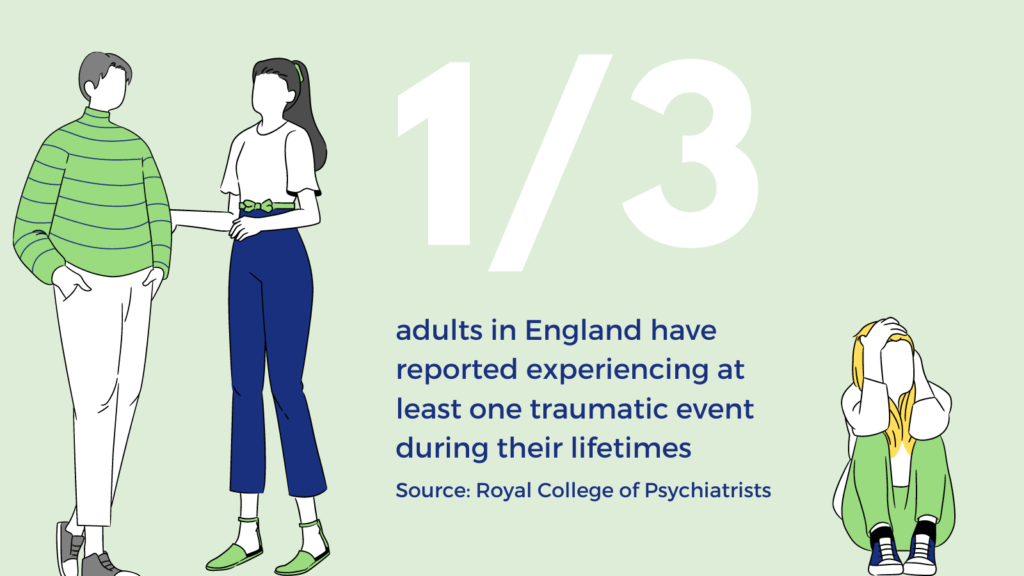It’s generally well known that 1 in 4 people will experience a mental health problem of some kind each year in England, with 1 in 6 people reporting experiencing a common mental health problem each week (Mind).

A lesser known fact is that approximately one third of adults in England have reported experiencing at least one traumatic event during their lifetimes (Royal College of Psychiatrists).
Feelings and behaviours associated with traumatic events
People who have experienced a traumatic event such as being seriously injured or witnessing a serious injury, may develop mental health issues. The feelings as a result of the incident can lead to behavioural changes, which, if not addressed, can result in ongoing mental health problems.
- The individual may experience memories, dreams and flashbacks of the incident. This is not only distressing at the time, but can lead to sleep avoidance, which in turn can lead to stress, anxiety and poor attention.
- The individual may feel upset when thinking or being reminded about the traumatic event, which can lead to avoiding certain people or places, or thoughts and feelings about the incident. This can make it very difficult for the individual to accept what has happened and impede their recovery.
- They may experience adjustment disorder, which can lead to symptoms such as feeling sad, hopeless or numb, experiencing anxiety, feeling negative about self or others, feeling guilt, fear, anger or shame. This may lead to difficulty concentrating, feeling overwhelmed and not feeling able to participate in or enjoy activities they used to. They may constantly be in a state of vigilance or self-destruction.
Feelings and behaviours that are still causing significant distress after a month can sometimes indicate that the person has developed post-traumatic stress disorder (PTSD).
This is where the feelings and emotions the person is experiencing are not getting better.
PTSD may be diagnosed as mild, moderate or severe. It’s important to note that this is not a reflection on the actual traumatic event, but a way of understanding the impact of the individual’s symptoms.
Not everyone who experiences a traumatic event will go on to have PTSD. Most people find they feel better over time.
PTSD treatment
PTSD can be treated successfully, even many years after the event. The NHS recommend seeking support from GPs for initial diagnosis. They are likely to initially recommend talking therapies, including psychotherapy and trauma-focused cognitive behavioural therapy (TF-CBT) to reduce and eliminate poor mental health symptoms.
These therapies help people come to terms with the trauma, either by helping them to accept and process the event or by changing the way they think about it.
Eye Movement Desensitisation & Reprocessing (EMDR) is also a popular treatment. This is a technique that helps the brain process trauma.
Where necessary, individuals can be offered medication such as selective serotonin reuptake inhibitors (SSRIs) better known as antidepressants.
While traumatic events can be extremely difficult to come to terms with, accepting and understanding the feelings that come with it and seeking professional help is the best way to recover and improve mental health.
PTSD support
If you are struggling with symptoms of distress following a traumatic event, there are a number of organisations that can offer advice and support:
NHS – find out more about PTSD and where to go for help.
PTSDUK – a charity dedicated to raising awareness of PTSD.
Mind – providing advice and support to anyone experiencing mental health problems and campaigning to improve services and raise awareness.
Mental Health Foundation – a charity that focuses on prevention and aims to improve everyone’s mental wellbeing.











